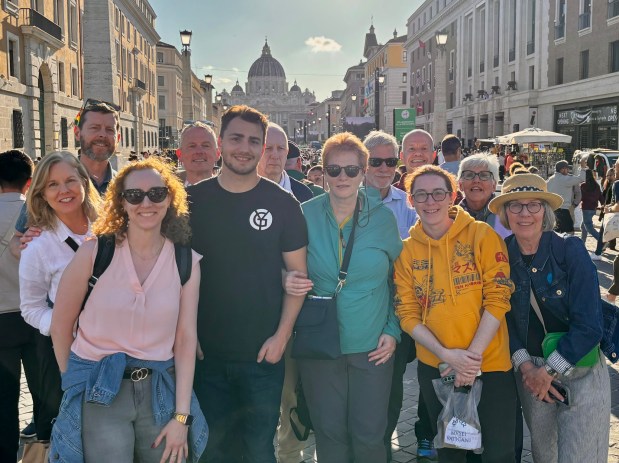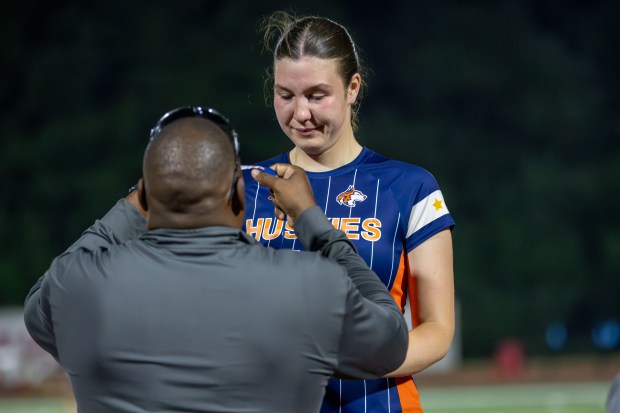More than a dozen members of a suburban Chicago church happened to get a surprisingly close look at the selection process for the Chicago-born Pope Leo XIV, the first American elected to lead the global Roman Catholic Church.
“We were underground, literally at the tomb of the first pope (Saint Peter) minutes before the election of the new pope,” said Rev. Dr. Daniel Cochran, an associate pastor at Gary Memorial United Methodist Church in Wheaton. “We stayed around the basilica and then, sure enough, at about 6:05 (p.m.), we saw the white smoke from the Sistine Chapel. We were right there, and the crowd erupts and everyone in Rome comes running.”
“Not only did we happen to be there that day, but then we were the ones to see the first American pope, let alone one from Chicago,” he said in a phone interview just hours after the new pontiff was announced. “There was a general sentiment of awe and excitement. It was such a novelty.”
That said, Cochran said the crowd’s reaction to Robert Francis Prevost being named pope at St. Peter’s Basilica was “lukewarm” compared to other papal audiences, such as when Cochran took groups to the Vatican for Easter masses and when he saw Pope Francis first appear after his 2013 election.
“There was a lot of surprise, certainly,” he said. “There’s a lot of uncertainty in this climate. When (the discussion in) American politics is about taking over or being more present in many parts of the world, the election of an American pope is questionable.”
Though members of the group are Methodist and not Catholic, the role of the pope and the Catholic Church he leads has far-reaching significance, even for non-Catholics, the pastor said.
“The Roman Catholic pope is the public face of Christianity across the world. Sometimes we Methodists and Protestants in general don’t like to acknowledge that, but it’s certainly been my experience that is the case,” Cochran said. “I go to get my hair cut in Naperville and when someone finds out I’m a Protestant pastor, they ask me what I think of the pope.”
“Protestants absolutely need to be aware of who’s elected pope, what their platform will be and how they express the traditions of the church in this time and place, because it matters,” he explained. “Whether he’s more conciliatory and open and ecumenical or whether he’s more isolationist or internally focused matters a great deal for the relations among Christians and between Christians and the world, no matter what tradition you’re a part of.”
Fourteen members of the Wheaton church accompanied Cochran, who studied the history of Roman and Christian art and architecture for his graduate degrees. The group scheduled their trip to Rome more than a year ago, and had long planned to be in the Vatican on Thursday. They were able to tour the Vatican museums on Thursday but had to skip the Sistine Chapel, because the conclave of cardinals was meeting there to choose the new pope.
Even before Pope Francis’ death last month, the Wheaton church members on the trip anticipated bigger-than-normal crowds and special celebrations in Rome to commemorate 2025 as a Jubilee Year, which the Catholic Church observes every 25 years.
The Methodist group also explored sites in Rome important to Jewish, Islamic and Protestant faiths, Cochran said.
Cochran said he was optimistic Leo would continue his predecessor’s work of reaching out to people across the globe.
In his initial address, Leo XIV emphasized the need for that sort of outreach.
“To the church of Rome, a special greeting,” he told the crowd in Italian. “We have to look together how to be a missionary church, building bridges, dialogue, always open to receiving with open arms for everyone, like this square, open to all, to all who need our charity, our presence, dialogue, love.”
Cochran was also heartened by the new pope’s choice of his papal name, which evokes the memory of Leo the Great, a fifth-century pope who convinced Attila the Hun not to attack Italy.
“I can’t help but see parallels in our contemporary climate,” he said, “with nationalist sentiments stoking conflict and war, and a pope who chooses the name of someone who turned back that conflict in the name of peace and security.”
Vock is a freelance reporter.




